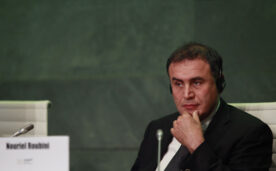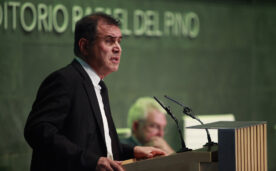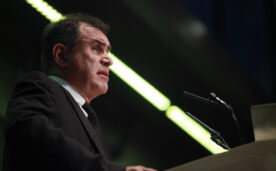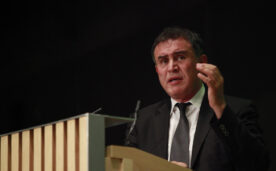On 22 October 2012, Professor Nouriel Roubini delivered at the Rafael del Pino Foundation the keynote lecture entitled "Can the Eurozone survive or will we see its ultimate collapse?
Nouriel Roubini is Professor at NYU's Stern School of Business and Chairman of Roubini Global Economics. Speaking ahead of the conference, Professor Roubini said: "I was aware of the global financial crisis coming because there was so much risk of leverage in many economies, from the US to Europe. I said it would be very serious, that it would be the worst financial crisis in a long time. Now there is some recovery, but there are also big risks to the global economy that could materialise next year."
Professor Roubini's view on what policy direction Europe should take was blunt: "I believe that what Europe needs is a plan to restore growth, which requires an easing of fiscal austerity policies. With Germany's leadership, Europe can afford it, it is possible to establish a looser monetary policy by the ECB and facilitate a gradual depreciation in the value of the euro that would restore growth and competitiveness to the periphery".
"Europeans are moving in the direction of greater union and integration, banking, fiscal, economic and political union, the union must move on the basis of democracy and legitimacy. If, otherwise, Europe moves in the direction of disunity, disintegration, fragmentation and balkanisation, as more and more countries have problems, eventually more economies will need restructuring, starting with Greece, which will result in one or more eurozone members leaving the eurozone, which could materialise in the next few years in a complete break-up of the eurozone".
Professor Roubini also gave us his perspective on the Spanish situation: "Spain is moving in the right direction, the restructuring of the banking system, fiscal austerity, which is necessary, the development of structural reforms, and so on. I would say that the pace of these reforms has been a bit uneven, some structural reforms are pending, mainly in the labour market and in the area of promoting competitiveness,..., on the contrary, in the fiscal area, I think that austerity has been excessive and that the government must be less harsh because otherwise the recession will get worse".
Professor Roubini is a leading international authority on macroeconomic analysis and finance, as well as on the challenges facing the capitalist system.
Nouriel Roubini is internationally known for having anticipated the mortgage crisis in 2008. subprime. He has published more than 70 theoretical and empirical papers and is co-author of the books "Political Cycles: Theory and Evidence", "Bailouts or Bail-ins? Responding to Financial Crises in Emerging Markets" and "Crisis Economics: A Crash Course in the Future of Finance" (published in Spanish as "Cómo salimos de esta" by Destino).
Professor Roubini's views on global economic issues are widely quoted in the media. He is a regular contributor to various news and discussion programmes and newspapers such as The New York Times Magazine and the Financial Times. His company's website, www.roubini.com, has been featured as a global reference by BusinessWeek, Forbes, The Wall Street Journal and The Economist.
Nouriel Roubini is also a consultant to the National Bureau of Economic Research and the Center for Economic Policy Research. Previously, he worked at the World Bank (1995-1998) and the International Monetary Fund (1988-2003). He was also a senior economist at the US President's Council of Advisors under President Bill Clinton's administration.







